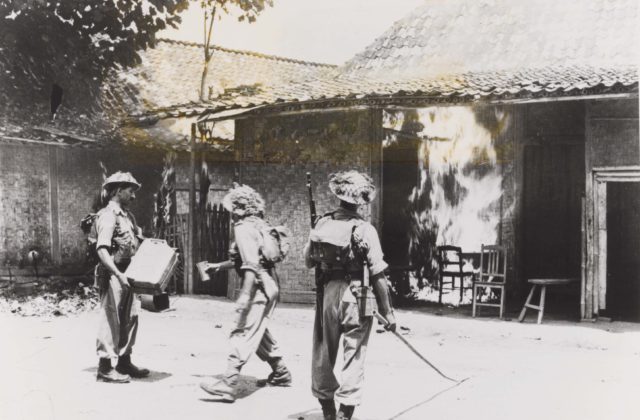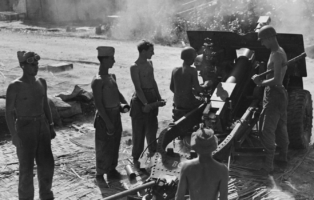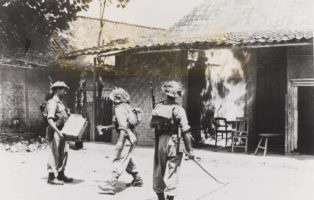Occupying the Indonesian Archipelago: Japanese and Dutch imperial justifications and the political use of history
The main lecture of this event. Writer Ian Buruma will talk about the political uses of history. While Japanese nationalists still justify the Japanese war in Asia by claiming that Japan liberated fellow Asian peoples from Western colonialism, the Dutch perception has historically been the opposite. After World War Two, Dutch soldiers were sent to the Indonesian Archipelago, supposedly to fight the Indonesian collaborators of Japanese fascism – Sukarno as a kind of Asian counterpart of the Dutch Nazi-leader Anton Mussert. Although few Dutch people would still subscribe to this view, the brutal Japanese occupation is still used to mitigate Dutch feelings of colonial guilt. The anti-Japanese feelings in the Netherlands, in the second half of the 20th century, were therefore perhaps also more extreme than in other countries.
The lecture will shed light on the Japanese and Dutch perceptions of Indonesia during and after the war. A comparative political analysis of this phenomenon is advantageous to avoid out of date theories about culture and national character.
‘Bloody de-/re-colonization: Dutch and French responses to revolutionary violence in the Indonesian archipelago and Indochina, 1945-1946.’
The second talk by NIAS theme group researchers Esther Captain and Pierre Asselin.
Extreme violence by Dutch security forces in the Indonesian archipelago has drawn a wave of scholarly and public attention in recent years. Similar processes have been taking place in France and the United Kingdom in relation to for instance torture, executions and mass deportation in colonial conflicts in Algeria, Malaysia and Kenya. To a lesser extent, the same is true for Indochina and the former Portuguese colonies. But research on the Dutch-Indonesian conflict (1945-1949) in the Netherlands has too long remained isolated, one might even say parochial. This has impeded our ability to fully understand the escalation of violence in this war.
This research project therefore aims to compare the causes, forms and nature of the extreme use of violence applied in the age of decolonization. It supports the larger research program Independence, Decolonization, Violence and War in Indonesia, 1945-1950. Experts from two sides of the comparison will explore the question which factors were shared among the wars in various empires (such as legacies of racism and colonial violence, or the nature of irregular warfare), and which factors may have been unique to certain cases (such as leadership, international scrutiny, or the legacy of Japanese occupation in the cases of Indonesia and Indochina). Overall, the comparison will broaden and deepen our understanding of Dutch, French, British, and Portuguese patterns in decolonization violence and the nature of colonial warfare in general.
About the speakers
Ian Buruma studied Sinology in Leiden and film in Tokyo. He was editor of culture for The Far Eastern Review in Hong Kong, editor of foreign affairs for The Spectator in London, and editor of The New York Review of Books. His articles appear in magazines and newspapers around the world. He writes a monthly column for Project Syndicate. His latest book is A Tokyo Romance – Dutch title: Tokyo mon amour.
Esther Captain is senior researcher and projectcoordinator of the Bersiap-study within the ‘Decolonisation, violence and war in Indonesia, 1945-1950’-programme. She previously has been employed as head of research at the National Committee for 4 and 5 May, a postdoctoral researcher at Utrecht University and the University of Amsterdam. She also worked as a projectmanager of Indo-European Heritage within the Heritage of the War-programme at the Ministry of Health, Welfare and Sports. Her latest book chapter is ‘The Selective Forgetting and Remodeling of the Past. Postcolonial Legacies in the Netherlands’ (2017) in: Stefan Jonsson and Julia Willén (eds.), Austere Histories in European Societies: Social Exclusion and the Contest of Colonial Memories. London: Routledge (Series: Routledge Advances in Sociology), 59-73
Pierre Asselin is Dwight E. Stanford Chair in the History of US Foreign Relations at San Diego State University. He is the author of A Bitter Peace: Washington, Hanoi, and the Making of the Paris Agreement (University of North Carolina Press, 2002), which won the 2003 Kenneth W. Baldridge Prize, and Hanoi’s Road to the Vietnam War, 1954-1965 (University of California Press, 2013), winner of the 2013 Arthur Goodzeit Book Award. His latest book, Vietnam’s American War: A History (Cambridge University Press, 2018), explores the Vietnamese communist experience during the Vietnam War.
Program
16.00 – 16.10 Welcome by Fenneke Wekker, Head of Academic Affairs NIAS
16.10 – 16.30 Opening words by Jan Willem Duyvendak, Director NIAS
16.30 – 17.00 “Occupying the Indonesian Archipelago: Japanese and Dutch imperial justifications and the political use of history”, by Ian Buruma
17.00 – 17.15 “Bloody De-/Re-colonization. Violence in the Indonesian Archipelago, 1945-1946”, by Esther Captain
17.15 – 17.30 “The Wars for Vietnam: the Weaponization and Evolution of History”, by Pierre Asselin
17.30 – 17.45 Panel discussion with Ian Buruma, Esther Captain and Pierre Asselin, moderated by Fenneke Wekker
17.45 – 18.45 Drinks in Tetterode Bibliotheek, Lutherse Kerk
Interview with Jan Willem Duyvendak
Read the interview with NIAS director Jan Willem Duyvendak on the political uses of history, the relationship between scholarship and the background of the researchers, and inviting Ian Buruma.
About the Annual NIAS Lecture
Since 2018, the Netherlands Institute for Advanced Study in the Humanities and Social Sciences presents the Annual NIAS Lecture. NIAS provides a safe-haven for curiosity-driven research, and interdisciplinary slow science. Thereby, it engages with societal issues and contributes to current debates by organizing public events for a broad audience.
Registration
You can sign up for this program for free via the website of SPUI25. If you subscribe for the program we count on your presence. If you are unable to attend, please let us know via spui25@uva.nl | T: +31 (0)20 525 8142.




